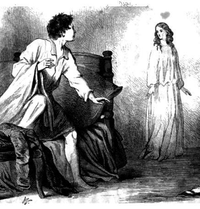I dreamed last night that I was brought into a room containing two upholstered chairs on raised platforms. “These are for Bristol and Levi,” someone told me, and I realized the chairs were thrones.
The alarm felt by many people by the advent on the national stage of Sarah Palin is not easy to explain. Objectively considered, she hardly seems threatening. She is uninformed and inexperienced, and her political past is riddled with costly errors, which it will be easy to expose. She has been compared to Dan Quayle, because of the speed with which humorists have pigeonholed her, and to Clarence Thomas, because of the heavy-handed tokenism behind McCain’s choice of her.
But I’m afraid that the better comparison is to George W. Bush, whom Palin did not mention in her speech last night. Bush, after all, was a governor when he was first tapped by the Republicans for nomination to the presidency. He had failed in business over and over before falling into politics, and like Palin, he had scandals in his past so embarrassing that most liberals assumed he would be easily discredited. (And in their eyes, he was.) Like Palin, Bush speaks in a thin voice, and his face is always tightly, thickly controlled when he speaks. When challenged, he has a peevish manner, suggesting that he hasn’t been appreciated, that he has been underestimated. And Palin toyed in her speech with a very similar chip on her shoulder. Eight years ago, Bush’s induction was very much a laying on of hands; there was a dynastic feel to it that transcended the mere fact that his father had been a president. And so with Palin. It is a neat trick—claiming to be an outsider when one’s presence on the national stage is owed to an anointing.
It succeeds, because underlying the intellectual contradictions is myth. In the case of George W. Bush, the myth was Prince Hal. He repudiated his Falstaffian past of drinking and unaccomplishment. But according to this myth, it was exactly his long history of having achieved little that was to make him great—he knew what it felt like to be for a long time someone dismissed as a loser but who senses within himself unrecognized power. He would remain one with the little people, among whom he had dwelt for so long. He would carry their hatred with him to the top of the world, and there he would launch war.
Sarah Palin comes with a slightly different myth. She is the princess, whom the aging king has chosen for his own and the nation’s rejuvenation. Her accomplishments, too, needn’t be scrutinized. As with Bush, her hollowness improves her political function. Accomplishments aren’t essential to the myth. More relevant are her children, whom she held to herself last night like a cornered bank robber taking a series of human shields. She was living in a small village in a remote corner of the kingdom, and the great king saw her and brought her to the palace. There he put her on the throne, and as queen she rewarded the little people who had been good to her when she was among them and she punished her cruel step-mother and her wicked ex-brother-in-law.
The appeal of Sarah Palin isn’t merely reactionary. It’s feudal. She was sour last night because feudalism, beneath the fairy-tale sugar coating, is sour. The mafia is the modern survival of it. It is about putting personal loyalties over principle and about rewarding that loyalty with spoils, seized from the weak. Palin’s Alaskan past suggests that if she were to become president, the betrayal of the public interest to private profit and personal vendetta, brought so far by George W. Bush, would go even farther.
UPDATE, 12:30pm: The Obama campaign has itemized some of the many lies in Sarah Palin’s speech accepting the vice presidential nomination. No one will be surprised to read that Obama has serious legislative achievments under his belt, or that Palin loves to raise taxes. Elements new to me: In addition to firing Public Safety Commissioner Walt Monegan without cause, Palin improperly hired one of her fundraisers, Tom Lamal, to a state job. And there are actually two bridges to nowhere, and Palin still supports one of them.


